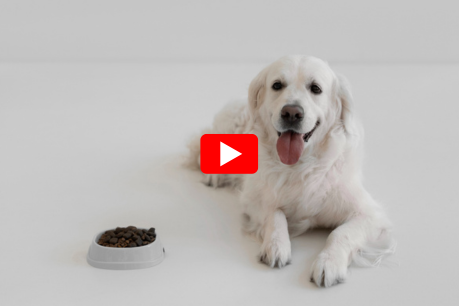Can Dogs Have Psyllium Husk: Benefits, Risks & Dosage Guide
When it comes to canine health, many pet parents turn to natural remedies to manage mild digestive issues like constipation, diarrhea, and irregular bowel movements.
Yes, dogs can have psyllium husk in moderation. It aids digestion, relieves constipation, and supports bowel health when given in proper doses.
One such popular natural remedy often discussed is psyllium husk. While widely used in human diets as a fiber supplement, many dog owners wonder — can dogs have psyllium husk? Is it safe, effective, and beneficial for them?
This comprehensive guide will unpack everything you need to know about psyllium husk for dogs, including its uses, potential benefits, recommended dosages, side effects, and important precautions.
What Is Psyllium Husk?
Psyllium husk is a form of soluble fiber made from the outer coating of the seeds of Plantago ovata, a plant native to India and the Mediterranean region.
It’s primarily known for its ability to absorb water and form a gel-like consistency in the digestive tract, which aids in regulating bowel movements.
In human wellness routines, it’s commonly found in fiber supplements and digestive aids. Due to its gentle and natural action, many veterinarians and holistic pet experts recommend it for dogs dealing with digestive disturbances.
Is Psyllium Husk Safe for Dogs?
Yes, psyllium husk is generally safe for dogs when administered appropriately and under the guidance of a veterinarian.
It is non-toxic and can be an effective, natural way to address common gastrointestinal issues in dogs. However, like any dietary addition, it should be introduced carefully and in controlled amounts.
Dogs of various breeds, sizes, and ages have been known to tolerate psyllium husk well, although individual sensitivities may exist. Monitoring your dog’s response to it is essential when incorporating it into their diet.
Benefits
Let’s break down the specific benefits psyllium husk can offer to your furry companion:
Relieves Constipation
Psyllium husk’s high soluble fiber content helps add bulk and moisture to your dog’s stool, making it easier to pass. It absorbs water, softening hardened stools and promoting regular bowel movements.
Helps Manage Diarrhea
Surprisingly, psyllium husk can also aid in cases of mild diarrhea. Its water-absorbing properties help firm up loose stools by balancing water content in the intestines.
Supports Anal Gland Health
Dogs prone to anal gland issues may benefit from psyllium husk, as bulkier stools help express the anal glands naturally during defecation, reducing discomfort and the risk of impaction.
Aids in Weight Management
Since fiber can promote a feeling of fullness, psyllium husk can help dogs who struggle with overeating. It slows digestion, reducing hunger pangs between meals.
Improves Overall Digestive Health
By regulating the passage of waste, psyllium husk promotes a healthier, more stable digestive environment, reducing occurrences of bloating, gas, and irregular bowel movements.
How to Give Psyllium Husk to Dogs
Psyllium husk is typically available in powder, capsule, or granule form. The easiest and most effective method for dogs is mixing the powder form into their food. It should be blended with a moist meal to prevent inhalation or choking.
Important Note:
Always ensure your dog has access to fresh water when consuming fiber supplements. Fiber without sufficient water can cause blockages or exacerbate constipation.
Recommended Dosage of Psyllium Husk for Dogs
The dosage of psyllium husk for dogs varies based on their weight and health condition. Here’s a general guideline:
| Dog Weight | Psyllium Husk Amount (Per Day) |
|---|---|
| Under 10 lbs | 1/2 tsp |
| 10-30 lbs | 1 tsp |
| 30-60 lbs | 2 tsp |
| Over 60 lbs | 3 tsp |
Administration Tips:
- Start with a lower dose and gradually increase based on tolerance.
- Mix it well into wet dog food or soaked kibble.
- Administer during mealtime to ease digestion and absorption.
- Avoid using flavored psyllium products designed for humans, as they may contain xylitol, sugars, or artificial sweeteners harmful to dogs.
Can All Dogs Have Psyllium Husk?
While generally safe, psyllium husk may not be suitable for every dog. Certain conditions and circumstances warrant caution or veterinary supervision:
- Puppies under 6 months: Their digestive systems are delicate.
- Dogs with chronic gastrointestinal diseases: It might interfere with treatment.
- Dogs on a low-fiber diet for medical reasons.
- Dogs with a history of intestinal blockages.
Always consult your vet before introducing psyllium husk into your pet’s routine.
Potential Side Effects of Psyllium Husk in Dogs
Though uncommon when used appropriately, some dogs may experience side effects, especially if introduced too quickly or in excessive amounts.
Possible side effects include:
- Bloating
- Gas
- Loose stools
- Nausea
- Loss of appetite
- Allergic reactions (rare)
If your dog shows any adverse symptoms, discontinue use and consult a veterinarian immediately.
Precautions When Giving Psyllium Husk to Dogs
To safely incorporate psyllium husk into your dog’s care regimen, keep these precautions in mind:
- Never give psyllium husk dry — always mix it with moist food.
- Monitor water intake — fiber requires adequate water for proper function.
- Use plain, unflavored psyllium husk only.
- Start with a small dose and gradually adjust as needed.
- Consult your veterinarian for long-term use or if your dog has pre-existing health conditions.
When Should You Avoid Psyllium Husk for Dogs?
Avoid giving psyllium husk if:
- Your dog has an intestinal blockage.
- They’re vomiting or showing severe digestive distress.
- They have difficulty swallowing.
- They’re extremely dehydrated.
In such cases, professional veterinary attention is necessary.
Psyllium Husk Alternatives for Dogs
If your dog doesn’t tolerate psyllium husk, several other natural fiber sources can be considered:
- Pumpkin puree (plain, canned)
- Oat bran
- Ground flaxseed
- Sweet potatoes
- Green beans
- Carrots
These can be safer or gentler alternatives for dogs with sensitive systems.
Conclusion
So, can dogs have psyllium husk? Absolutely — when used responsibly and in the correct dosage, psyllium husk can be a valuable natural aid for managing mild digestive issues, supporting regular bowel movements, and enhancing overall gut health in dogs.
However, like any dietary change or supplement, it’s essential to monitor your dog’s reaction and consult with your veterinarian, especially for long-term use or in dogs with existing medical concerns.



